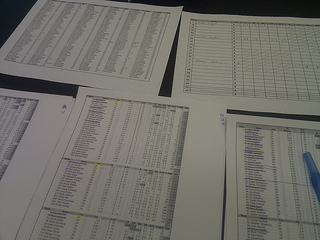The supply chain of any organization is a complex system that has to be adapted to the needs of the business. Correct identification of the nature of the problem has subsequently generated Planning Studio 100, a Complex Adaptive System (CAS), whose area of expertise is supply chain planning.
On Board Intelligence is a company with more than twenty years of experience working with dozens of clients to not only properly plan their supply chain, but do so optimally, from very simple ones to very complex ones with several levels known as multi-echelon supply chain networks.
Planning Studio 100 optimizes the operations of supply chains characterized by lead times ranging from a few days, to several months. From those in which SKUs are sold daily (fast moving consumer goods) to those in which parts are only sold from time to time (slow moving items).From companies with inventories of a standard set of SKUs (such as in the Chemical industry) to those where the company is continually introducing new categories of inventory (such as some textile retailers).
The functionality of Planning Studio 100 covers demand forecasting, service and inventory optimization, supply planning, distribution planning, sales, inventory and operations planning (SI&OP) as well as measuring and registering all the key indicators of the supply chain.
Planning Studio 100 is used by dozens of companies around the world and all of them have in common the priority given to achieve outstanding service levels with minimum inventories at all times, adapting their operations to meet customer demand.
Our Technology
The technology we have developed in On Board Intelligence is distinguished by two fundamental features:
-
Minimum human intervention
Planning Studio 100 is known for its intelligence, which is the same as its ability to solve problems without the user having to intervene on each step of the process.
-
Adaptiveness
Planning Studio 100 is known for its adaptiveness, which is the same as its ability to modify its behaviour depending on the data.
User interaction with Planning Studio 100 is very different from what you may be used to with ERP. The user no more acts as the supervisor of the system who continuously changes previously calculated results and that role is replaced by:
-
Design of strategies
The user designs strategies that are implemented by Planning Studio 100 without having to re-parameterize the database completely. For example, how much inventory can we reduce for products from supplier X, if instead of purchasing once every fortnight, we do it weekly?
-
Backorder and/or out of stock SKU review
Every day, the planner can review in detail the complete information for all the SKU's that are on backorder, or those which are out of stock in a shop producing lost sales. Taking a close look at those SKU's every day, reviewing their forecasts, stocks and supplies and taking decisions that will assure that it will not happen again.
State of the art Technology
Planning Studio 100 is an assistant to the logistics department that can analyze all existing information on the ERP system and take the right decision in every situation. To make this a reality, Planning Studio 100 features demonstrate an expertise in mathematics, statistics, operational research and artificial intelligence.

In On Board Intelligence we have been concerned with assuring that Planning Studio 100 masters all these techniques, but also more importantly, that it can identify which data sets are the most appropriate to apply for any given situation.
Many software systems calculate forecasts using hundreds of different algorithms and choose the one which minimizes forecast error. It is assumed that the algorithm used is independent of the data that we provide or that such an algorithm can be used regardless of the initial conditions. It is clear that when someone acts in such a way, the algorithm is known, but not under which conditions should never be applied.
All this knowledge is applied to the following areas of supply chain planning:
- Demand Forecasting
- Demand Sensing
- Service optimization
- Inventory optimization
- Supply planning
- Distribution planning
- SI&OP Reporting and Charting
- Vendor Managed Inventory
Plan and Measure
It is not enough to use the most advanced techniques from statistics and artificial intelligence to plan your supply chain in a way that you are more efficient than your closest competitors.

It is not enough to acquire the best tools that allow us to perform daily analysis of all existing data in the ERP to make the right decisions.
At the end of the day, the only thing that matters are results, i.e. service level achieved yesterday, inventory value at the warehouse, backorder and/or obsolescence value, etc.
These and some other business indicators measure what the shareholders of our companies pay us for. What matters is not the technology but the results.
Planning Studio 100 is able to measure and record the value of all these indicators on a daily basis, and many more, so that the planner can compare the results with the reality of what has been achieved having the skills to change the strategies in view of real results.
The job of Planning Studio 100 as assistant to the logistics department of your organization does not finish when a plan has been calculated, but it also measures results, so that people in your organization can check the quality of the decisions taken by the system as well as the strategies that the user has chosen to implement.
What makes us different?
The technology we have developed in On Board Intelligence is characterized by three main features:
-
Intelligence
Planning Studio 100 solves very different problems without the need to be assisted by the user. This is achieved by being able to accurately identify highly heterogeneous case mixes and apply very different solutions in each case.
-
Adaptiveness
Planning Studio 100 identifies changes that occur in the supply chain and adapt to these changes without any human intervention and without having to re-parameterize the system.
-
Scalability
Planning Studio 100 analyzes millions of SKU's in a few hours. This analysis allows decisions to be made without any human intervention facilitating an unprecedented speed of response to the daily challenge of serving customers.

The values that distinguish the members of On Board Intelligence are:
-
Multidisciplinary knowledge
We do not believe that the challenges faced by planning the supply chain can be solved using a single science discipline such as statistics.
Having expert knowledge of basic sciences like mathematics is completely necessary to efficiently solve the challenges that we face.
At the same time, the application of the state of the art techniques from artificial intelligence and operational research are absolutely necessary in order to make optimal decisions automatically.
-
Passion for research
Not a small part of our time is dedicated to research and testing the latest techniques taken from university research that allow models to deal with the new challenges that we have to face today.
BPO (Business Process Outsourcing)
On Board intelligence sells its technology in two different ways. Most of our customers use the Planning Studio 100 by themselves; it is a traditional software business.
However for some of our customers, we have become their planning department and we take sourcing and distributions decisions for them. These decisions are materialized every day in purchase and distribution orders transferred to their ERP systems. To offer these services, we connect our systems with the customer´s and we are in continuous contact thanks to our account managers, who are the communication channel with the customer.
This type of relationship with our customers is governed by agreements that while they cover all aspects related to the confidentiality of the information; ensure perfectly measurable results of key indicators such as the level of customer service, inventory turns or obsolescence. This is what is known as an SLA or "Service Level Agreement".

For each customer we make a tailor-made offering based on their needs because not all customers have the same goals and the same problems. Even within the same customer, targets and requirements change over time and our obligation is to adapt to those changes.
Among the advantages that this type of agreement has for the client, we would highlight the following ones:
Customers do not assume any risks, since it is a success based agreement. If it does not generate the agreed results, the service is concluded.
The customer counts on experienced and professional personnel to achieve the agreed objectives, proved by previous projects achievements in other organizations.
Less time required to go live compared with a standard implementation, since there is no need to train the customer's staff.
There is no cost associated with the ownership of systems, such as maintenance, management or technical specialists in the field, etc.
Companies like Mazda have been working with OBI this way and year after year we achieved the pre-agreed goals.
